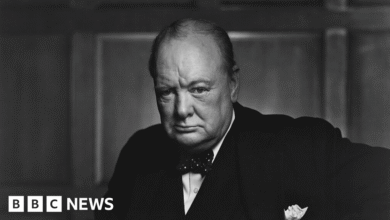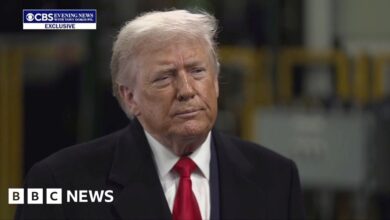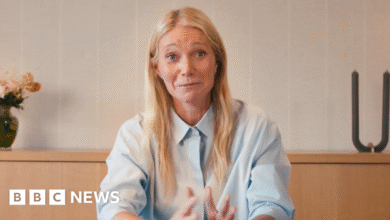World leaders criticise Trump tariffs as ‘major blow’
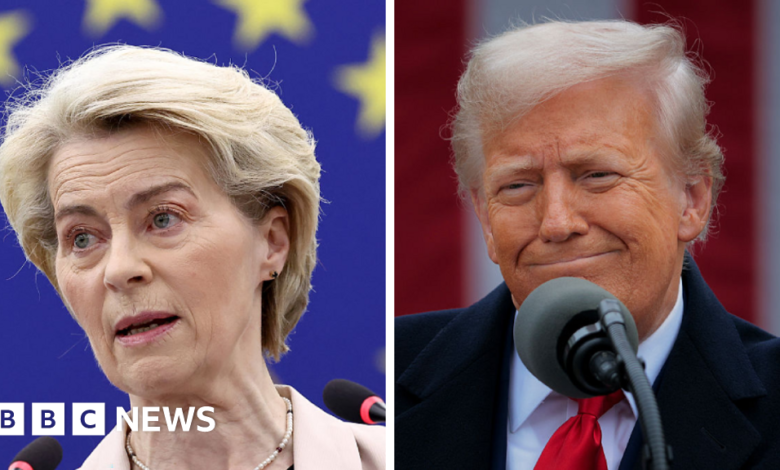
BBC News
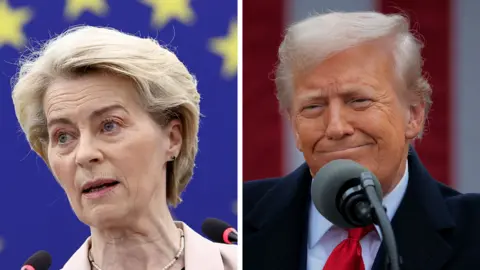 Getty Images/BBC
Getty Images/BBCDonald Trump’s decision to impose new tariffs on all goods entering the US is a “major blow to the world economy”, European Commission chief Ursula von der Leyen has said.
Her comments echo those of a number of other countries, including China, which has expressed its opposition to the move and has warned it will take “resolute countermeasures” against the US.
Their words of warning come after the US president announced a universal 10% tariff on all imports into the US from 5 April. Around 60 countries will also be hit with steeper tariffs from 9 April.
Trump said the measures were payback for unfair trade policies, adding that he had been “very kind” in his decisions.
Giving a statement on Thursday morning, von der Leyen said the new tax imports will see “uncertainty spiral”, causing “dire” consequences “for millions of people around the globe”.
She emphasised the impact on the most vulnerable countries, pointing out that some of those nations are now subject to some of the highest US tariffs.
The EC chief vowed Europe would take a unified approach and warned that the European Union – which will be subject to a 20% tariff – is preparing countermeasures in case negotiations fail.
“If you take on one of us, you take on all of us”, she said.
Italy’s Giorgia Meloni, a Trump ally, said the decision was “wrong” but that she would work towards a deal with the US to “prevent a trade war”.
Her Spanish counterpart Pedro Sánchez said Spain would “continue to be committed to an open world”, while in Ireland, Taoiseach Micheál Martin said Trump’s decision was “deeply regrettable” and benefitted “no-one”.
Outside the EU, China – one of the countries deemed the “worst offenders” by the US president – was hit with a 34% tariff on goods, on top of an existing 20% levy, bringing total duties to at least 54%.
The ministry of commerce urged the US to “immediately cancel” the tariffs, adding that China would “resolutely take countermeasures to safeguard its own rights and interests.”
South Korean acting President Han Duck-soo said the global trade war “has become a reality” and his government would be looking at ways to “overcome the trade crisis” after the East Asian country was hit with a 25% rate.
Japan said its 24% levy was “extremely regrettable” and could violate World Trade Organization and US-Japan agreements, while Thailand said it would negotiate its 36% tariff.
Economic officials in Israel, which had scrapped all tariffs on American imports ahead of the announcement, were said to be in “complete shock” over its 17% tariff, local media reported.
“We were sure that the decision to completely cancel tariffs on imports from the US would prevent this move”, an official told local media.
White House officials said its levies were reciprocal to countries, such as China, which it said charge higher tariffs on US goods, impose “non-tariff” barriers to US trade or have otherwise acted in ways the government feels undermine American economic goals.
Leaders from countries subject to the 10% baseline rate have also reacted to Trump’s measures, with Australia’s Anthony Albanese saying Americans would end up paying the biggest price for what he called “unjustified tariffs”.
His government will not impose reciprocal measures, he said, adding: “We will not join a race to the bottom that leads to higher prices and slower growth”.
A Downing Street source told the BBC that the UK’s lower tariff “vindicates” the government’s recent efforts towards a trade deal with the US.
Business Secretary Jonathan Reynolds said the government remained “fully focused on negotiating an economic deal with the US that strengthens our existing fair and balanced trading relationship”.
In Latin America, its biggest economy, Brazil, approved a law in congress on Wednesday – the Economic Reciprocity Law – to counter the 10% tariff imposed by Trump.
The foreign ministry said it would evaluate “all possible actions to ensure reciprocity in bilateral trade, including resorting to the World Trade Organization”.
Shortly after Trump’s announcement, US Treasury Secretary Scott Bessent warned countries not to “retaliate” and “sit back, take it in”.
“Because if you retaliate, there will be escalation”, he told Fox News.
Noticeably, the US’s two biggest trade partners, Canada and Mexico, were not mentioned in Wednesday’s announcements.
The White House said it would deal with both countries according to previous executive orders, which imposed 25% tariffs on the two nations as part of efforts to address fentanyl and border issues.
Regardless, Canada will still be impacted by the tariffs, Prime Minister Mark Carney said. Measures such as the 25% tariff on automobiles starting at midnight on Thursday would “directly affect millions of Canadians”, he added.
He vowed to “fight these tariffs with counter measures”, adding that the US levies would “fundamentally change the global trading system.”
https://ichef.bbci.co.uk/news/1024/branded_news/b54b/live/3bb6dfb0-103f-11f0-b234-07dc7691c360.png
2025-04-03 04:54:49



